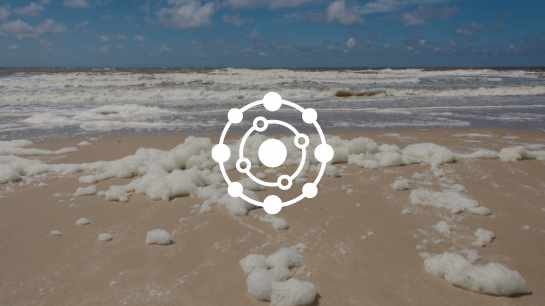Er is steeds meer nieuws rondom PFAS. PFAS dat in groente en fruit is teruggevonden, PFAS in ons leidingwater, PFAS-eieren door kippen. Maar wat is PFAS nu eigenlijk en waarom is dit iets om rekening mee te houden voor jouw gezondheid?
PFAS zijn chemische stoffen
PFAS staat voor per- en polyfluoroalkylstoffen. Het zijn chemische stoffen die vanwege hun water-, vet- en vuilafstotende eigenschappen in veel producten zitten zoals regenkleding, cosmetica, schoonmaakproducten en voedselverpakkingen. PFAS zit als het ware vastgebonden aan of in het materiaal van een product. Het kan daardoor in heel kleine hoeveelheden vrijkomen uit producten. Bij normaal gebruik van het product zullen er niet meteen gezondheidsrisico’s ontstaan, alleen wanneer je te veel PFAS binnenkrijgt is dit schadelijk voor je gezondheid.
PFAS en schadelijkheid
De laatste tijd is PFAS steeds vaker in het nieuws omdat dit terug wordt gevonden in de bodem, in voedsel en in consumentenproducten. Maar nu ook in het zeeschuim waarover de overheid een waarschuwing uitstuurde. Speel niet met zeeschuim!
Uit onderzoek blijkt dat PFOA en PFOS, zogenoemde GenX-stoffen, leverschade veroorzaken, effect hebben op ons immuunsysteem, schadelijk zijn voor de voortplanting en voor de ontwikkeling van het ongeboren kind. Ook zijn ze mogelijk kankerverwekkend. Wanneer mensen over een lange periode kleine hoeveelheden PFAS binnenkrijgen kan dit een negatief effect hebben op het immuunsysteem.
Beter voorkomen dan genezen
Je kunt natuurlijk zelf al actie ondernemen om de blootstelling aan PFAS te verminderen. Koop bijvoorbeeld geen producten die zijn gemaakt met deze stoffen. Aan welke producten moet je daarbij denken?
- Kookgerei en pannen met antiaanbaklaag
- Waterafstotende textiel; denk aan regenjassen, outdoor kleding, schoenen, tapijten en vloerkleden met vlekbestendige behandelingen.
- Voedselverpakkingen: vetbestendige papieren en kartonnen verpakkingen zoals popcornzakken, fastfood verpakkingen en pizzadozen.
- Schoonmaakproducten die vlek- en waterafstotende eigenschappen hebben.
- Make-up: sommige soorten make-up zoals foundation, mascara en lippenstift. Lees altijd de etiketten!
- Anti-aging cremes en lotions.
- Verf en coatings: vlek- en waterafstotende verfsoorten
Bescherm je immuunsysteem
Naast het vermijden van producten waar PFAS in zit, zijn er eenvoudige stappen die je kunt nemen om je blootstelling aan schadelijke stoffen aanzienlijk te verminderen. Om de toxines die PFAS veroorzaken op te ruimen in je lichaam hebben we enkele praktische tips:
- Kies voor biologisch voedsel
Biologisch eten kan helpen om vormen van PFAS te vermijden. Het is daarbij vooral belangrijk op producten van de “dirty dozen lijst” te vermijden.
- Vermijd plastic en blik bij het bewaren en verwarmen van voedsel
Plastic verpakkingen kunnen minuscule deeltjes vrijgeven die in je eten terechtkomen, vooral bij verwarming. Probeer voedsel zo min mogelijk in plastic bakjes te bewaren en gebruik liever glazen verpakkingen. Neem ook je eigen herbruikbare mok of thermoskan mee voor warme dranken om plastic bekertjes te vermijden.
- Kies voor natuurlijke verzorgingsproducten
Overweeg natuurlijke alternatieven voor zonnebrandcrème, make-up, deodorant, shampoo en andere verzorgingsproducten. Er zijn tegenwoordig veel natuurlijke varianten beschikbaar die even effectief zijn zonder schadelijke chemicaliën.
- Gebruik natuurlijke schoonmaakproducten
Vermijd schoonmaak- en wasmiddelen die vol zitten met chemicaliën. Kies in plaats daarvan voor natuurlijke alternatieven zoals azijn, zuiveringszout en citroensap. Deze zijn net zo effectief en veel vriendelijker voor het milieu en je gezondheid.
- Installeer een waterfilter
Helaas komt PFAS ook steeds meer voor in ons drinkwater. Overweeg daarom om een waterfilter op je kraan te installeren om deze schadelijke stoffen te verwijderen en te zorgen voor schoon en veilig drinkwater.
- Zorg voor voldoende magnesium
Magnesium is essentieel voor (onder andere) de aanmaak van het antioxidant glutathion. Dit antioxidant ruimt toxinen in het lichaam op. Zeker wanneer je meer blootstelling aan PFAS ervaart is het essentieel om op jouw magnesiumvoorraad te letten.
- Voed je lichaam met antioxidanten
Naast magnesium zijn er natuurlijk nog meer voedingsstoffen essentieel in het beschermen tegen schadelijke stoffen en vrije radicalen zoals PFAS. Antioxidanten zijn cruciaal voor het afbreken van toxinen in het lichaam en het opruimen van vrije radicalen. Zorg ervoor dat je voeding eet die rijk is aan antioxidanten, zoals vitamine C, vitamine E, alfa-liponzuur en anthocyanen. Deze stoffen zijn te vinden in een verscheidenheid aan voedsel, waaronder fruit zoals bessen, druiven, granaatappels en pruimen, en groenten zoals boerenkool, tomaten, broccoli en spinazie. Andere bronnen zijn noten, chocolade met meer dan 72% cacao, en groene, zwarte en witte thee.








